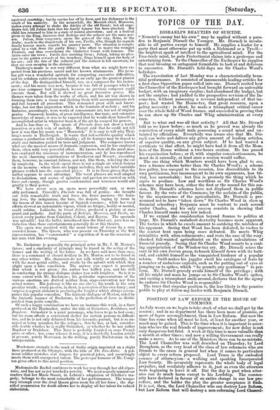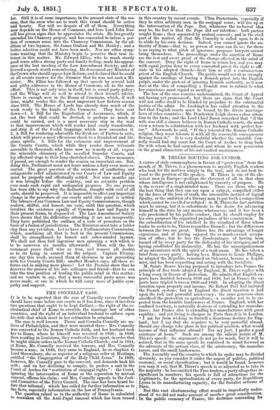POSITION OF LAW REFORM IN THE HOUSE OF COMMONS.
As July wears on we begin to take stock of what we shall get by the session ; and in no department has there been more of promise, or more of begun accomplishment, than in Law Reform. But now the time has come when all must be lost, at least for another year, or much may be gained. This is the time when it is important to ascer- tain who are the real friends of improvement; for now delay is not only dangerous but fatal. A week at this time is more valuable than a month at other times ; and now a willing Government can really make a move. As to one of the Ministers there can be no mistake. The Lord Chancellor was well described on Thursday, by Lord Brougham, as the very head of the class of law reformers who are friends to the cause in general but when it comes to particulars objtct to every reform proposed. Lord Truro is the embodied essence of attorneyism—a walking and speaking Incorporated Law Society. He accurately represents the whole body of legal prejudice, and resolutely adheres to it, just as even the attornies were beginning to leave it off. But the day is past when attor- nies can do much harm except to his Lordship. The commu- nity have declared in favour of an entire change in our law pro- cedure, and the bolder the plan the greater acceptance it finds. It is not, then, the Lord Chancellor who can destroy Law Reform, but Law Reform that will destroy a non-reforming Lord Chancel- lor. Still it is of some importance, in the present state of the ses- sion, that the crew who are to work this vessel should be active and hearty. Nor will we despair of all of them. Everything now depends on the House of Commons, and here Lord John Rus- sell has given signs that he appreciates the crisis. He has greatly amended his Chancery project, and has consented to infuse a por- tion of common sense into the Chancery Commission, by the ad- dition of two laymen, Sir James Graham and Mr. Henley ; and a better selection could not have been made. Nor are other symp- toms wanting that the Ministry begin to perceive their true in- terest in this matter. Mr. Edward Ellice, who to much sturdy good sense adds a strong party and family feeling, made his appear- ance at the last meeting of the Law Amendment Society, and de- livered a speech worth remembering. He denounced any Minister of the Crown who should oppose Law Reform, and declared that he could at all events answer for the Premier that he was not such a Mi- nister. Mr. Ellice has followed up that speech by several bold and pithy addresses in the House of Commons, all to the same effect. This is not only wise in itself, but is sound party policy; and the Whigs will do well to attend to their friend's advice. There is enough now in the House of Commons, which, if well done, might render this the most important Law Reform session since 1834. The House of Lords has already done much of the work ready to the hands of the Commons. They have sent down-1. A Bill for the Registration of Assurances, which, if not the best that could be devised, is perhaps as much as could be carried, and is a most necessary step in the road to that improvement which will render land easily transferable, and strip it of the feudal trappings which now encumber it. 2. A. Bill for rendering admissible the Evidence of Parties to suits, which will prove a most efficacious check to a fraudulent and liti- gious spirits. 3. Bills for the extension and improvement of the County Courts, which while they render those tribunals accessible to thousands who have now no remedy at all, expose the miserable chicanery of the so-called Superior Courts, and lay effectual siege to their long-cherished abuses. These measures, if passed, are enough to render the session an important one. But, doing this, Parliament must not leave undone a duty even more es- sential. The great question of the existence of conflicting and antagonistic relief administered in our Courts of Law and Equity must be properly and effectually settled. Not nine months ago it was brought before the country, and no scientific problem ever made such rapid and undisputed progress. No one person has been able to say why the distinction, fraught with evil of all sorts, should be preserved. It is impossible to effect any important change in the procedure of our courts until this point is settled. The labours of our Common Law and Equity Commissioners, though zealont, skilful, and honest, are vain, until this question, which involyee the existence equally of Common Law and Equity in their present forms, be disposed of. The Law Amendment Society have shown that the difficulties attending it are not insuperable. They have published the outlines of a code of procedure on the basis of a fusion of jurisdictions. The Ministers must take a bolder step than any yet taken. Let us have a Parliamentary Commission, which, combining all that is best in the present Commissions, shall be strengthened by honest and sober-minded laymen. We shall not then find ingenious men spinning a web which is to be unwoven six months afterwards. Thus will the Go- vernment prove itself wise as true, and remove all doubts as to its being in earnest on the subject. Captain Fitzroy, one day this week, accused them of slowness in not proceeding with the County Courts Bill: another Member says, all these re- forms end in making more places! Let the Premier show that he deserves the praises of his late colleague and friend—that he can take the true position of leading the public mind in this matter ; and we venture to say, that a more successful party move was never made, or one in which he will carry more of public sym- pathy and support.



























 Previous page
Previous page